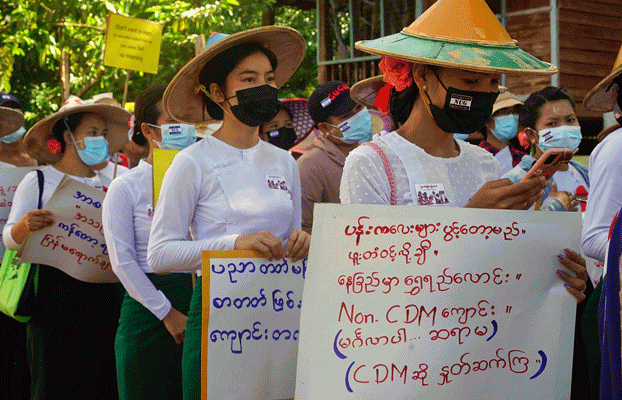10 injured as Cambodia cracks down on NagaWorld protest
At least ten people were injured Monday when security forces in Cambodia’s capital Phnom Penh violently dispersed a strike, ramping up a crackdown on workers involved in a six-month-old labor dispute with the NagaWorld Casino. Strikers told RFA Khmer that “hundreds” of security personnel were deployed to set up roadblocks and otherwise stymie the peaceful protest by around 150 mostly female NagaWorld workers near the downtown casino. They said authorities beat them when they wouldn’t board a bus sent to ferry them away from the area, leaving 10 people in need of medical attention. A worker named Chan Srey Roth said a security officer hit her in the head with a walkie talkie and repeatedly insulted her during the incident, while other officers “grabbed male workers by the hair and smashed their heads” against the side of the police vehicle. “They are members of the national security forces, whose duty is to protect the people, not to use violence against them – particularly against women,” she said. “We raised our hands, begging them not to beat us, but they did so anyway, ordering us to disperse. When we interlocked our hands, they tried to break our chain and dragged us off, one by one, to brutally beat us. One of them hit me in the face with a walkie talkie and kicked me, while cursing at me.” Another worker, Phat Channa, said authorities are increasingly turning to violence to break up gatherings by her group as protesters refuse to board the buses police have used to relocate them to Prek Pnov district, on the outskirts of Phnom Penh. “They beat me unconscious. I was shocked because they didn’t bother to consider that we are women – they just dragged us away and beat us like dogs,” she said. “We have experienced a lot of injustice. We are only demanding the right to work, but they beat us like beasts.” Other protesters told RFA that authorities prevented civil society representatives and United Nations human rights officials from monitoring Monday’s protest and threatened to confiscate the phones and cameras of anyone seen documenting the incident, unless they deleted their photos and video. A statement issued by the Phnom Penh government claimed that Monday’s protest was “an ugly event that was planned in advance by a handful of people seeking to make the authorities look bad.” “They disrupted social and public order, leading to violence that left a number of authorities injured and resulted in the loss of five walkie talkies and one watch.” Government Human Rights Committee spokesperson Kata Un accused the strikers of holding an illegal rally and called the response by authorities “an educational measure.” “In the case of illegal acts, the authorities have the right to use whatever measures are necessary to stop, disperse, or suppress the perpetrators,” he said. “So far, the Phnom Penh authorities have not taken any repressive measures. What the authorities are doing is educating people to avoid restricted areas and to instead hold protests in Freedom Park [in the Phnom Penh suburbs].” Six-month dispute Thousands of NagaWorld workers walked off their jobs in mid-December, demanding higher wages and the reinstatement of eight jailed union leaders, three other jailed workers and 365 others they say were unjustly fired from the hotel and casino owned by a Hong Kong-based company believed to have connections to family members of Cambodian Prime Minister Hun Sen. The strikers began holding regular protest rallies in front of the casino, drawing the attention of NGOs and U.N. agencies who have urged Cambodia’s government to stop persecuting them and help resolve their dispute in accordance with labor laws. Cambodian authorities allege that the strikes by NagaWorld workers are part of a “foreign plot to topple the government,” although they have provided no evidence to back up their claim. An increasingly tough response by security personnel led to pushing and shoving during a strike outside the casino’s offices on May 11 that one worker claimed caused her to miscarry her pregnancy two weeks later. Am Sam Ath, chief of General Affairs for Cambodian rights group LICADO, told RFA that authorities have made the NagaWorld dispute worse by leveling allegations against the workers and cracking down on their protests. “We don’t want to see a labor dispute between NagaWorld and its workers turn into a dispute between the authorities and the workers,” he said. “What we want to see is a peaceful settlement to the issue, and these incidents of violence don’t benefit anyone.” Am Sam Ath urged the Ministry of Labor, as well as other relevant state institutions, to remain neutral and end their accusations against the NagaWorld workers and called for a resolution of the dispute in accordance with the law and international labor practices. Translated by Sok Ry Sum. Written in English by Joshua Lipes.





